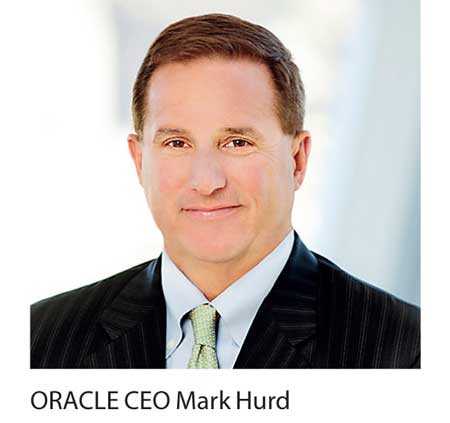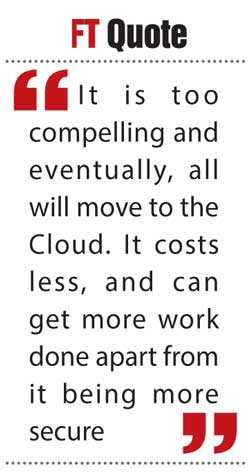Wednesday Feb 18, 2026
Wednesday Feb 18, 2026
Friday, 2 November 2018 00:00 - - {{hitsCtrl.values.hits}}
 Oracle’s Software as a Service (SaaS) offering, led by Enterprise Resource Planning (ERP) solution, is winning more customers given the host of benefits, the global giant’s CEO Mark Hurd said last week.
Oracle’s Software as a Service (SaaS) offering, led by Enterprise Resource Planning (ERP) solution, is winning more customers given the host of benefits, the global giant’s CEO Mark Hurd said last week.
Speaking to a group of select media, including the Daily FT, at the Oracle OpenWorld 2018 in San Francisco, Hurd said Oracle is winning the SaaS battle with this segment growing three to four times faster than the market in Applications. “With double digit growth, we are expanding faster than the market,” he added.
According to the CEO, the Oracle Cloud ERP revenue grew more than 60% last year with $ 2.2 billion in Cloud ERP and Human Capital Management (HCM) sales. It was up 30% in 1Q of FY19.
“It is too compelling and eventually, all will move to the Cloud. It costs less, and can get more work done apart from it being more secure,” Hurd added.
Oracle today has 5,500 Cloud ERP customers in addition to 15,000 by Group entity NetSuite. “We have a market share of 21% in the ERP industry,” he added.
He said Oracle added over 1,700 Fusion ERP customers in the past year, 30 times more ERP customers and three times more HCM cloud customers than Workday.
Hurd said that all markets in Asia, including emerging economies, are recording good growth for Oracle ERP solutions. “Our success with Netsuite, too, has been impressive in Asia,” he added.
He said that moving existing users to Cloud would double total Applications revenue from around $ 11 billion to over $ 20 billion. “We are positioned to be the overall leader in SaaS,” Hurd added.
According to Hurd, the back office applications market is twice as big (around $ 80 billion) as the front office segment ($ 40 billion). “Historically, the biggest software categories have been the database and ERP,” he added.
A key contributor to Oracle’s success in SaaS is that it focused on it over a decade ago and has been building the best-of-the-breed applications.
“Each app is individually the best in the industry – be it ERP, Supply Chain Management, Procurement, HR, financials, etc. Today, we have a suite of solutions and all integrated to work together to maximise value for customers. It is important these solutions work together, which means common user interface, making it easier to move data from one app to another as opposed to previous generation apps, which made it difficult,” Hurd explained. 
“Our apps are built in the same environment, be it HR, ERP, SCM, etc. Collectively, it is the broadest offering in the market, whether it’s back office or front, to meet customers’ most difficult challenges,” he added.
As a company, Oracle has also made significant investment in innovation over the year with FY18 alone – the value being $ 6.1 billion from around $ 3.5 billion in FY11.
Oracle was also the first to embed artificial intelligence, machine learning and blockchain to Oracle SaaS. “For Oracle, AI and machine learning are not solutions but features, and they are integrated directly into the applications, such as ERP/Enterprise Performance Management (EPM) to deliver rapid, data-driven insights and empower CFOs to drive new business models, capitalise on new market opportunities and increase profitability.
He said that 30% of finance department time is spent on doing spreadsheets, and if that work is eliminated, an organisation gets that much of increase in productivity.
Extending its lead in the cloud ERP market, Oracle at its OpenWorld 2018 in San Francisco announced new AI updates to its ERP Cloud and Enterprise Performance Management (EPM) Cloud. The latest machine learning-based innovations deliver rapid, data-driven insights which empower the office of the CFO to embrace new business models, capitalise on new market opportunities, and increase profitability.
According to Oracle, over 5,500 organisations in 85 countries and 23 industries have selected Oracle ERP Cloud to provide a complete, innovative, and secure financial platform for their organisation.
Oracle ERP Cloud helps organisations of all sizes quickly and easily take advantage of the latest innovations in AI, digital assistants, natural language processing, blockchain, and the Internet of Things to enable enhanced productivity, reduced costs and improved controls.
The latest innovations within Oracle ERP Cloud include:
Intelligent Process Automation – Seamless integrations across Oracle Cloud Applications of intelligent rules-based processing enable the automation of labour-intensive tasks and allow organisations to redeploy employees to more strategic and rewarding work.
Expense Reporting Assistant – A new chatbot assistant improves controls and audit compliance by processing expenses with greater efficiency and accuracy, while also simplifying expense reporting for end users.
Intelligent Payments – New AI capabilities enable organisations to reduce costs and build stronger relationships with top suppliers by taking advantage of in-the-moment supplier profile and risk data to generate vendor-specific offers in exchange for early payment of outstanding payables.
Supplier Recommendations – Smart, multi-factor categorisation and ranking of suppliers help optimise the procure-to-pay process. By combining ERP applications data about suppliers, purchase orders, invoices, payables, and other details with external sources of data, businesses can gain unparalleled insight into their company’s supplier ecosystem.
Intelligent Performance Management – Embedded AI capabilities in Oracle EPM Cloud can uncover hard-to-spot data patterns to deliver actionable and contextual insights at the right time, helping improve the quality and business impact of financial and operational decisions.
Advanced Access Controls – Advanced access controls embed AI to constantly examine all users, roles, and privileges against a library of active security rules. This include more than 100 best practices (configurable rules) across general ledger, payables, receivables, and fixed assets to help protect business data from insider threats, fraud, misuse and human error.
Oracle ERP Cloud helps organisations automate core business processes, integrate disparate systems, and streamline financial business processes and technology requirements. This enables customers to rapidly adapt to changing business demands and achieve a competitive advantage by increasing productivity, reducing costs, creating a single source of the truth, and driving end-to-end business innovation.
Oracle ERP Cloud was named a leader in Gartner’s ‘Magic Quadrant for Cloud Core Financial Management Suites for Midsize, Large and Global Enterprises’. Oracle ERP Cloud is positioned the highest for ability to execute. Furthermore, Oracle was positioned in the leaders quadrant of the 2018 ‘Magic Quadrant for Cloud Financial Planning and Analysis Solutions’ with the highest position for its ability to execute, and was also named a leader in the 2018 ‘Magic Quadrant for Cloud Financial Close Solutions’.